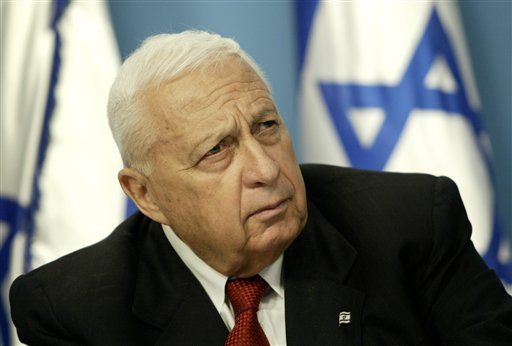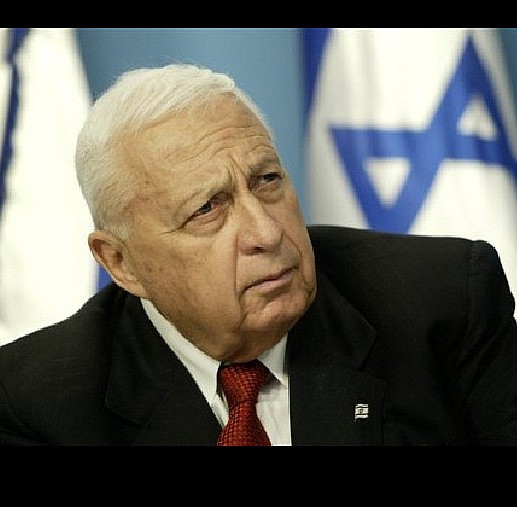 In this Sunday May 16, 2004, file photo, Israeli Prime Minister Ariel Sharon pauses during a news conference in his Jerusalem office regarding education reform. On Wednesday, Jan. 1, 2014, the condition of the comatose former Israeli Prime Minister Ariel Sharon has taken a turn for the worse, the hospital treating him said Wednesday. Sharon, 85, has been in a coma since 2006 when a devastating stroke incapacitated him at the height of his political power.
In this Sunday May 16, 2004, file photo, Israeli Prime Minister Ariel Sharon pauses during a news conference in his Jerusalem office regarding education reform. On Wednesday, Jan. 1, 2014, the condition of the comatose former Israeli Prime Minister Ariel Sharon has taken a turn for the worse, the hospital treating him said Wednesday. Sharon, 85, has been in a coma since 2006 when a devastating stroke incapacitated him at the height of his political power.JERUSALEM - Ariel Sharon, the hard-charging Israeli general and prime minister who was admired and hated for his battlefield exploits and ambitions to reshape the Middle East, died Saturday, eight years after a stroke left him in a coma from which he never awoke. He was 85.
As one of Israel's most famous soldiers, Sharon was known for bold tactics and an occasional refusal to obey orders. As a politician he became known as "the bulldozer," a man contemptuous of his critics while also capable of getting things done.
He led his country into a divisive war in Lebanon in 1982 and was branded as indirectly responsible for the massacre of hundreds of Palestinians at the Sabra and Chatilla refugee camps outside Beirut when his troops allowed allied Lebanese militias into the camps. Yet ultimately he transformed himself into a prime minister and statesman.
Sharon's son Gilad announced the death on Saturday afternoon. Sharon's health had taken a downturn over the past week and a half as a number of bodily organs, including his kidneys, stopped functioning.
"He has gone. He went when he decided to go," Gilad Sharon said outside the hospital where his father had been treated in recent years.
The life and career of the man widely known by his nickname "Arik" will be remembered for its three distinct stages: his eventful and controversial time in uniform, his years as a vociferous political operator who helped create Israel's settlement movement and mastermind of the Lebanon invasion, then his successful term as a pragmatist prime minister, capped by a dramatic withdrawal from the Gaza Strip and curtailed at the height of his popularity by his sudden stroke.
The Gaza pullout culminated a gradual abandonment of the hard-line policies for which he was known. In the tumultuous summer of 2005, he pulled all of Israel's settlers and soldiers out of the seaside strip, having played a key role in putting them there in the first place. "The fate of Netzarim is the fate of Tel Aviv," Sharon had famously said, referring to a Gaza settlement, just three years earlier.
Characteristically, the move was unilateral; Sharon was dubious that much good could come of talks with the Palestinians.
Sharon painted his "disengagement" plan as a step to reduce friction between Israelis and Palestinians. It was accompanied by construction of a massive separation barrier in the West Bank. While presented as security measures, they also represented an admission of sorts that continued control of the fast-growing Palestinian population could threaten Israel's Jewish and democratic character.
A few months later he left the hawkish Likud party, which he helped found, and created the centrist Kadima as a vehicle for himself, planning to lead it to a third election victory. But a few months later -- 77 years old, and considerably overweight -- he suffered two strokes. The second one, in 2006, left him comatose in a Jerusalem hospital. His deputy, Ehud Olmert, became prime minister and led Kadima to victory in the election.
Olmert eulogized him in a statement. "His entire life, Arik stood at the front line of fire in the place where the fate of the state of Israel was determined," Olmert said. He said Sharon's life was "soaked in courage, human warmth, vision and leadership at the critical moments when the state of Israel needed all these."
President Shimon Peres, a longtime friend and rival, said Sharon was "a brave soldier and a daring leader who loved his nation and his nation loved him."
"He was one of Israel's great protectors and most important architects, who knew no fear and certainly never feared vision," Peres added
Sharon was reviled by Palestinians. "We will remember Ariel Sharon as the man who killed, destroyed and caused the suffering for several Palestinian generations," said Khalil Al Hayya , a leader of the ruling Hamas militant group in the Gaza Strip. "After eight years, he is going the same direction as other tyrants and criminals whose hands were covered with Palestinian blood."
See more in Sunday's Times Free Press.
